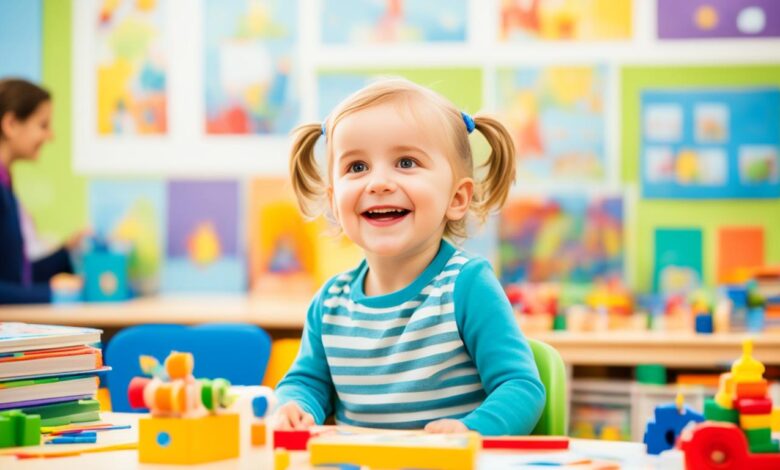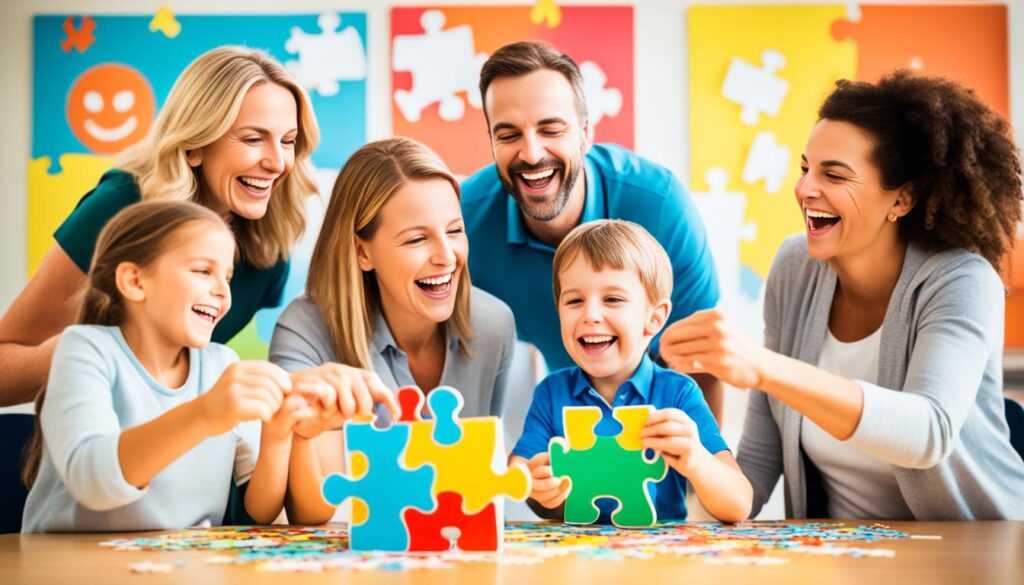
The first day of kindergarten is both thrilling and a bit scary for parents. Will my child fit in and make friends? A principal with 40 years of experience offers valuable advice to help your child start strong in school.
Key Takeaways
- Leverage your child’s strengths and interests to build confidence
- Nurture their sense of identity to foster independence
- Tour the school and collaborate with staff to address any concerns
- Establish a predictable routine before the school year begins
- Avoid lingering on the first day and discourage spontaneous visits
A seasoned principal says the secret to a smooth start in kindergarten is to prepare your child emotionally and academically. Use their curiosity and creativity to make them excited about this new chapter. Getting them familiar with the school and working with teachers can ease their worries.
The principal stresses the need for a positive attitude and clear expectations from the start. With careful planning and lots of love, your child’s first day can be the start of a great educational journey.
Preparing Your Child for Kindergarten Success
Getting your child ready for kindergarten means more than just learning ABCs and 123s. It’s about helping them grow into a confident, curious, and eager learner. Kindergarten readiness is about building a well-rounded child.
Build on Their Strengths and Interests
Every child is special with their own talents and interests. By doing activities that match their interests, you make learning fun and important. For example, if your child loves art, let them try different art forms and make their own art.
If they like reading, spend time reading together. This helps their language and literacy skills. The goal is to make learning fun and meaningful through play.
Nurture Their Identity
Starting a new school can be scary for kids. Helping them feel good about who they are can make the change easier. Talk with them about their family, culture, and what makes them special.
This helps them feel important and understood by others. It also builds their social-emotional skills.
Getting your child ready for kindergarten means building a strong base in child development and fine motor skills. Do fun activities with them that show off their strengths and interests. This way, they start school feeling confident and excited.
https://www.youtube.com/watch?v=kKt8fk-YJ8Q
Collaborating with the School
Building a strong school-parent partnership is key for a smooth kindergarten transition. It also helps your child do well in school and socially. The principal says it’s important to be involved in your child’s learning journey.
Keep in touch with your child’s teacher and the school principal regularly. Share updates on your child’s strengths, challenges, or new skills. This helps the school support your child better.
Also, try to volunteer at the school when you can. It builds a strong community feeling. Plus, you learn more about what the school offers and any issues they face.
| Strategies for Effective School-Parent Collaboration |
|---|
|
Working together with the school helps your child get the support they need during the kindergarten transition. This partnership keeps you updated and involved in your child’s education.

“The more involved parents are in their child’s education, the more successful the child will be in school.” – Unknown
Transitioning to Kindergarten
Getting your child ready for kindergarten is a big step towards a great start in school. The school’s principal talks about key strategies to make the kindergarten transition easier and help your child be ready for school.
One important tip is to take your child on a school tour. This helps them get used to the school’s look and feel, easing separation anxiety. Let them check out the classrooms, playground, and other key spots. Then, take photos to make a “social story” they can look at before school starts.
Before school starts, start a daily classroom routine at home. This makes your child feel safe and ready for school. But, don’t spend too much time on the first day or drop by unexpectedly, as it can make them more anxious.
By showing your child the school and creating a daily routine at home, you’re helping them adjust smoothly to kindergarten. This prepares them for a great start in their academic journey.
| Strategies for Successful Kindergarten Transition | Benefits |
|---|---|
| Tour the school with your child | Familiarizes child with the physical environment, reducing separation anxiety |
| Create a “social story” with photos | Helps child visualize and prepare for the school environment |
| Establish a consistent classroom routine at home | Provides a sense of security and school readiness |
| Avoid lingering too long on the first day or making spontaneous drop-in visits | Prevents prolonging child’s anxiety and disrupting the adjustment process |
“By taking the time to familiarize your child with the school environment and fostering a sense of routine and security at home, you can help ensure a smooth kindergarten transition and set the stage for a successful academic journey.”
kindergarten, tips
Starting kindergarten is both exciting and a bit scary for kids and parents. Luckily, the school’s principal has shared some great tips for a smooth start. These tips include fun activities and routines to help kids do well in kindergarten.
The principal suggests having play-dough ready on the first day. This activity lets kids explore and be creative, making them feel more at ease. It’s also important to teach and practice classroom rules and how to use school supplies like pencils and crayons.
To keep students interested, the principal recommends using songs, movement, and reading aloud. These activities help students move between tasks and stay engaged in learning. The principal’s advice is to mix structure with flexibility for a well-rounded kindergarten experience.
The principal’s tips cover everything from creating a caring classroom to offering learning tools. By following these kindergarten tips, parents and teachers can make the first day of school special and memorable for kids.
After the first day, the principal’s advice also covers ongoing classroom activities and teacher recommendations. Working with the school and using these educational resources helps parents support their child’s kindergarten success.
Conclusion
Preparing your child for kindergarten takes a lot of effort. It’s important to use their strengths and help them be their best self. Working closely with the school helps make the move smoother for both your child and you.
The strategies shared by the principal are very helpful. They cover kindergarten readiness, school transition, and early childhood education. With these tips, parents can help their kids start strong in school. The principal’s advice is like a beacon, guiding families towards a positive kindergarten experience.
Starting this new journey is exciting, but remember, every child is different. There will be ups and downs. But with the right approach, support, and resources, your child can do great in kindergarten. This sets the foundation for a lifetime of learning and growth.
FAQ
What are the key strategies parents can use to ensure a smooth and successful transition into kindergarten for their child?
A seasoned elementary school principal with 40 years of experience suggests focusing on your child’s strengths and interests. It’s also key to instill a strong sense of identity. Touring the school and being open with staff about concerns is crucial. Lastly, establishing a predictable routine before school starts is vital.
Why is it important to focus on a child’s strengths and interests when preparing them for kindergarten?
The principal believes that focusing on strengths and interests helps avoid forcing skills the child doesn’t want to learn. Engaging the child in activities they enjoy, like reading or art, makes learning more fun. This approach prevents power struggles and frustration.
How can parents nurture their child’s sense of identity to help them feel empowered and secure in the new school environment?
Parents should encourage their child to share about their family and background. This helps the child feel connected and secure in their new school.
Why is it important for parents to establish a collaborative relationship with the school and be transparent about any concerns or needs their child may have?
Being open with school staff about your child’s strengths and challenges helps ensure they can support your child well. The principal also suggests volunteering at school and keeping in touch with teachers. This builds a strong community feeling.
What are the principal’s recommendations for easing the transition to kindergarten?
The principal suggests touring the school with your child and taking photos for a “social story.” This helps the child get used to the school setting. Establishing a routine at home before school starts also helps the child feel secure.
What specific tips did the principal provide for the first day of kindergarten?
The principal recommends using play-dough as a fun activity for students on their first day. It’s also important to teach classroom rules and how to use school supplies. Songs, movement, and read-alouds throughout the day help students adjust and stay engaged.




